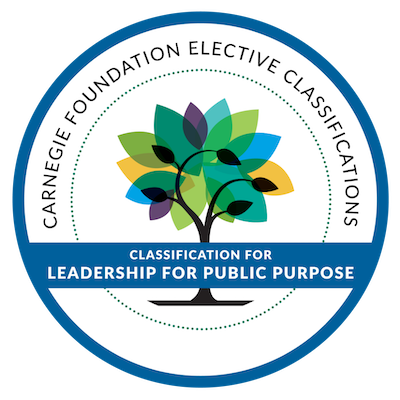HOUSTON – (March 29, 2022) – Leadership education and development proponents have two new ways to elevate their commitment to developing skills students need to become leaders: the Carnegie Elective Classification in Leadership for Public Purpose (LPP) and HigherLed, a digital resource community.
Applications are now open for the LPP classification, spearheaded and sponsored by Rice University’s Ann and John Doerr Institute for New Leaders in partnership with the Carnegie Foundation for the Advancement of Teaching and the American Council on Education.
The elective classification asks institutions of higher education to assess their own leadership education and development performance – the application probes the training and development of staff, faculty and students to ensure a complete picture. If they can prove extraordinary institutional commitment through the resources provided by their campuses, they can receive the Carnegie Foundation’s endorsement as a Classified Institution.

The Doerr Institute, the administrative and research host for the LPP, began forming the initiative in January 2020 when more than 30 leadership experts representing colleges and universities from around the country convened on Rice’s campus.
The meeting gathered a broad range of institutions — public, private and community — as part of the Consortium for Improvements in Leadership Education and Development. The attendees examined the existing field of leadership education and development and drafted a proposal for the LPP classification, which builds on the success of the Carnegie Foundation’s Community Engagement Classification.
“The consortium discussed and debated how leadership education, development and research is critical to higher education’s public purpose during the initial summit,” said Tom Kolditz, founding director of the Doerr Institute. “We wanted to be able to work with a range of institutions representing a diversity of students to define how a classification could serve the higher education sector as a whole.”
The work of the Doerr Institute and the consortium, which now includes 288 scholars and practitioners from 164 institutions, spurred the creation of HigherLed. It’s a first-of-its-kind digital community and learning network supporting higher education stakeholders interested in improving their efforts to develop tomorrow’s leaders.
“We see leader development as a unique value proposition for institutions,” said Carla Ortega Santori, strategic initiatives manager at the Doerr Institute. “By creating an open network to share resources for improving and expanding the field, HigherLed aims to radically advance leader development in higher education across the board.”
Access to HigherLed is not limited to college or university communities. Anyone can join, free of charge, and browse resources and share new ideas.
“We want to make HigherLed as accessible as possible to leadership scholars and developers who are eager to improve their efforts in developing students,” Ortega Santori said. “That's why anyone can join the network at no charge and access the library of free resources and research. Any member of HigherLed can participate in conversations, polls and events because they’re meant to connect members and resources from around the world.”

The community, which includes an app, allows members to access materials and courses to launch and support leader development and education programs. Members can explore best practices and share their own resources and insights with the community.
Beyond the library of free resources, HigherLed members can also purchase exclusive resources and access to digital training courses.
To learn more about leadership development initiatives at the Doerr Institute, visit doerr.rice.edu.

